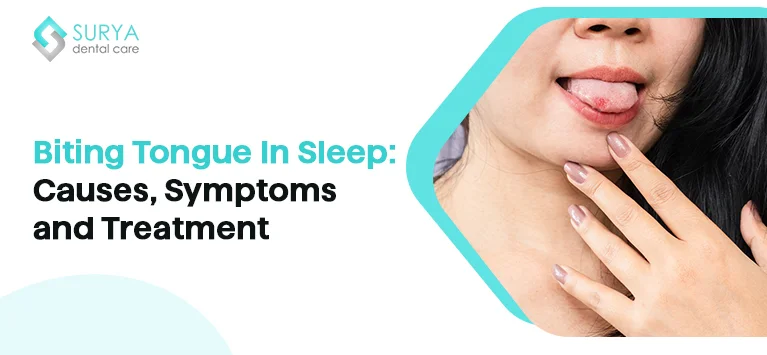Normally, most of us bite our teeth accidentally during eating, In between the conversation, and in case of some injuries. This biting is annoying and also causes some sharp pain once you bite the tongue, and you may notice a swollen bump on the bitten area of the tongue. Usually, children chew their tongues to indicate hunger, and also, in sporadic cases, children bite tongue in their sleep.
Most of the adults also bite their tongue during sleep due to misalignment of teeth, stress, anxiety, sleep apnea and bruxism. This blog post explains what causes adults to bite their tongue during sleep, along with its symptoms and treatment options.
Causes of Biting Tongue in Sleep
Bruxism
Bruxism is the condition of involuntary grinding or clenching of teeth, and it is one of the common causes of biting the tongue during sleep. This habit can lead to muscle contractions that inadvertently cause the tongue to be trapped between the teeth, which end in bites. Statistics about Sleep bruxism show nearly 50% of children, 8% of middle-aged adults, and 3% of older adults are affected by teeth bruxism.
Sleep Apnea
Sleep apnea disorder can contribute to tongue biting. Patients with sleep apnea usually have more giant tongues and relaxed muscles in the mouth. These conditions can disrupt standard sleep patterns and increase the likelihood of involuntary movements or behaviors during sleep. A study shows how facial mandibular myoclonus relates to tongue biting in sleep.
Medications
Some prescription medications, particularly those used to treat mental health conditions or neurological disorders, can have side effects that include involuntary muscle movements or altered sleep patterns that lead to tongue biting. Also, research on rats shows that the intake of MDMA (ecstasy) can create a high intensity to bite or chew.
Stress and Anxiety
High levels of stress and anxiety can increase muscle tension and contribute to bruxism, which in turn can lead to tongue biting. Stress and anxiety could cause tongue biting both during the day and during sleep.
Anatomical Factors
In some cases, the size, shape, or positioning of the tongue or teeth may make an individual more prone to biting the tongue during sleep. The misalignment of teeth is also known as Malocclusion. You can get the proper alignment of your teeth by consulting an orthodontist and getting treatments like dental aligners and braces.
Symptoms of Biting Tongue in Sleep
Pain or Discomfort
The most apparent symptom of biting the tongue during sleep is pain or discomfort in the affected area. This can range from mild soreness to severe pain, depending on the extent of the bite.
Swelling or Inflammation
As the tongue is a sensitive area, it may respond to repeated biting by causing swollen bumps in the affected area, leading to further discomfort and difficulty with eating or speaking. These swollen bumps on the tongue may take up to two to four days to heal.
Bleeding or Lacerations
In more severe cases, biting the tongue can result in bleeding or lacerations, which can be a source of concern. If the bleeding continues, you may require medical attention.
Interrupted Sleep
The pain or discomfort associated with tongue biting can disrupt sleep, leading to poor sleep quality and daytime fatigue.
how to stop biting tongue in sleep
Here are some list of treatments for stop biting tongue in sleep
Dental Mouth guards
One of the most effective treatments for biting the tongue during sleep is the use of a custom-fitted dental mouthguard or splint. These devices can help protect the tongue and prevent it from becoming trapped between the teeth.
Medication
In some cases, healthcare providers may prescribe medications to address the underlying causes of tongue biting, such as bruxism or sleep disorders. Painkillers to get rid of pain are also prescribed, like oral acetaminophen and ibuprofen.
Stress Management
Incorporating stress-reducing techniques, such as relaxation exercises, meditation, or counseling, can help alleviate the muscle tension and anxiety that can contribute to tongue biting.
Dietary Changes
Adjusting the diet to include more magnesium-rich foods or supplements may reduce muscle spasms and the likelihood of tongue biting.
Behavioral Modifications
Practicing good sleep hygiene, maintaining a consistent sleep schedule, and avoiding substances that can disrupt sleep (such as alcohol or caffeine) may help to prevent tongue biting during sleep.
When to Consult with a Dentist
Are you one biting your tongue in sleep or clenching your teeth in the middle of the day? Then consult with the dentist, as tongue biting can be more serious when there is severe continuous bleeding. Also, a dentist can screen to identify the causes of tongue biting and treat you with tailored treatments that heal the bitten tongue faster.
Takeaway
Biting the tongue during sleep can be a concerning and disruptive issue, but with the proper understanding and approach. It can be effectively managed. By addressing the causes, seeking appropriate treatment from dentists and implementing preventive measures an individual can enjoy a more restful and comfortable sleep experience.
FAQs
Biting the side of the tongue while sleeping is often linked to malocclusion, where misaligned teeth cause the tongue to get caught between them. Other contributing factors include bruxism and nocturnal seizures, which can lead to uncontrolled movements, increasing the likelihood of tongue injuries during sleep.
Sudden tongue biting during sleep may indicate underlying issues such as stress or anxiety, which can manifest during dreams. Additionally, bruxism and muscle spasms can contribute to this behavior, leading to accidental bites as the jaw clenches or moves involuntarily at night.
Biting your tongue in your sleep can be attributed to several factors, including anxiety, bruxism (teeth grinding), and malocclusion (misalignment of teeth). These conditions can lead to involuntary movements that result in tongue biting during sleep, causing pain and discomfort upon waking.
Accidentally biting your tongue can result from several factors, including bruxism (teeth grinding), malocclusion (misalignment of teeth), or even stress and anxiety. These conditions can lead to involuntary jaw movements during sleep, increasing the likelihood of tongue injury.
Sleeping with your tongue between your teeth may occur due to misalignment of teeth or bruxism, where you unconsciously grind or clench your teeth at night. This position can be a natural response to maintain airway openness or relieve pressure on the jaw during sleep.







